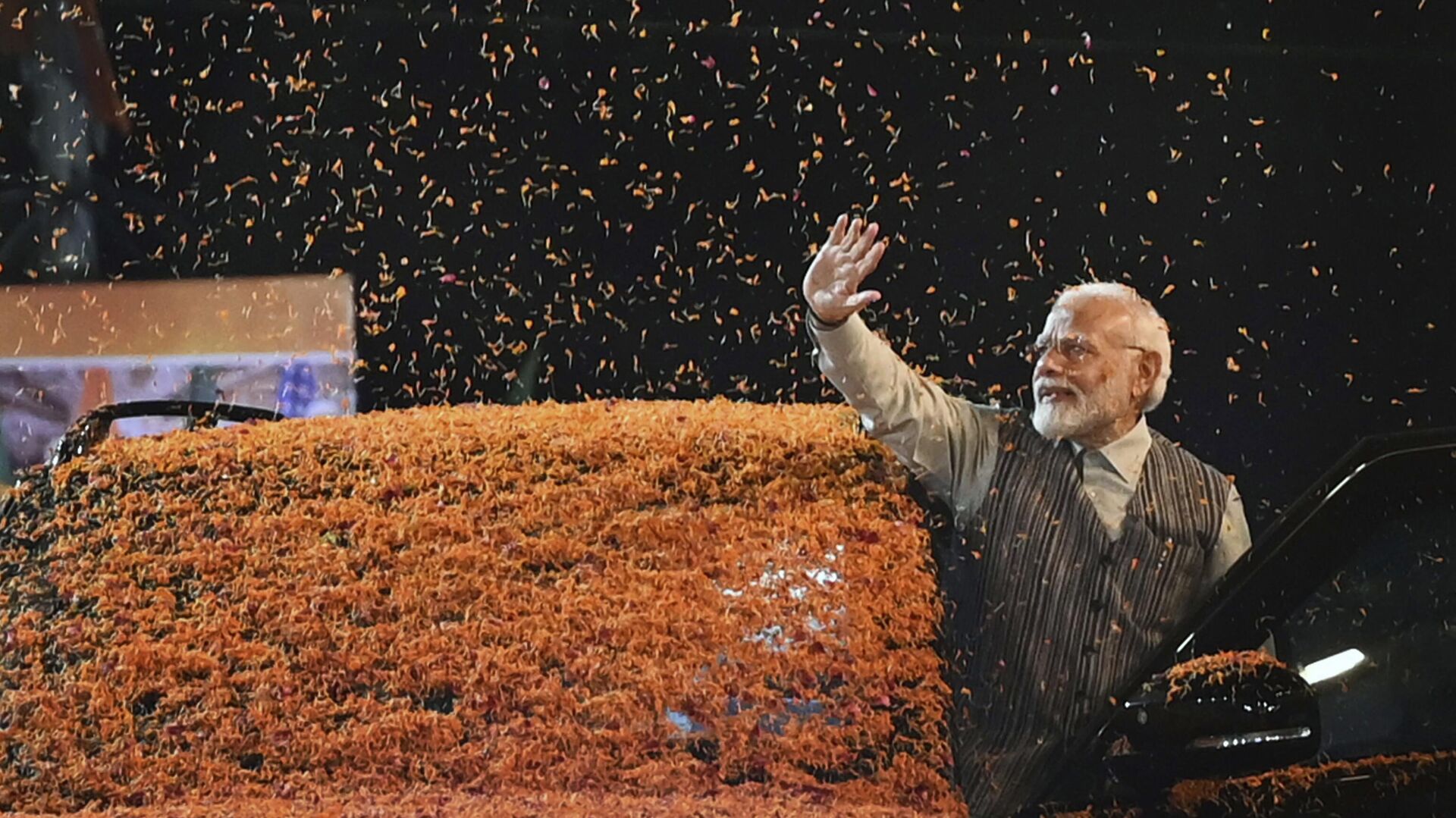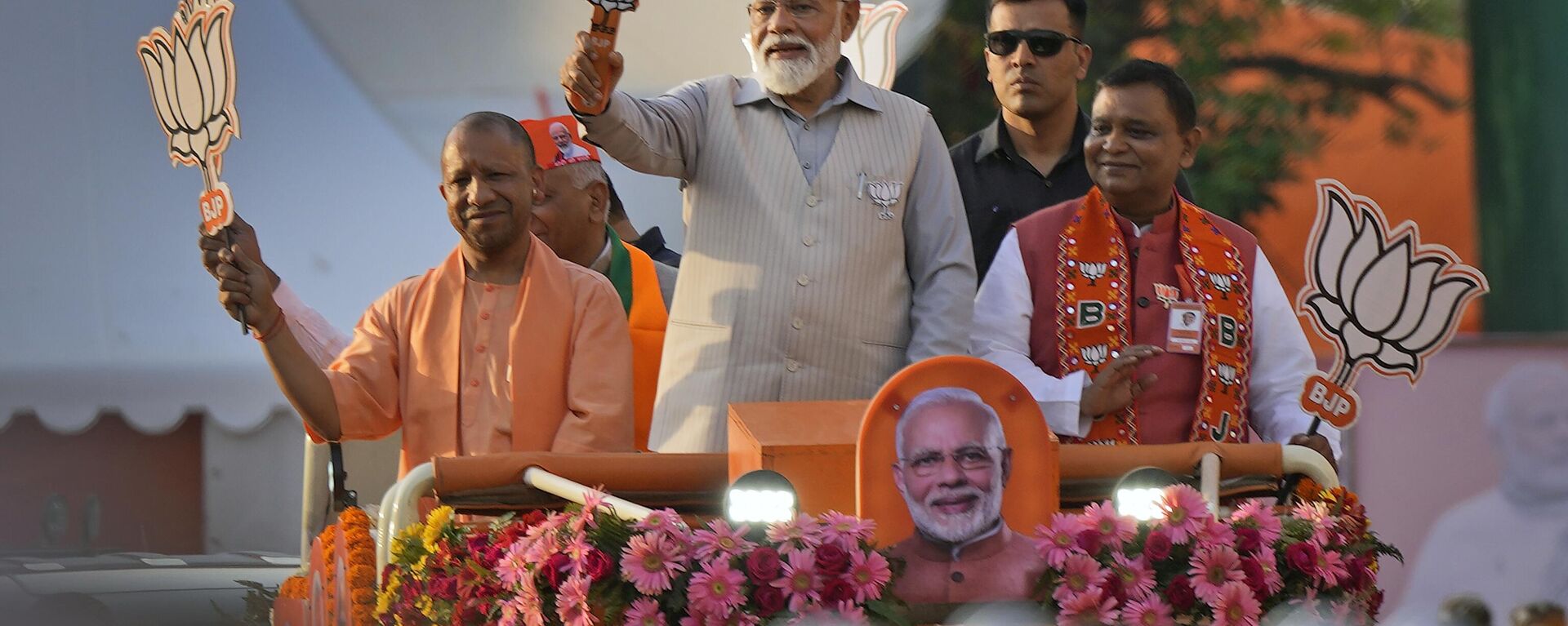https://sputniknews.in/20240422/western-medias-narrative-against-bjp-is-clearly-to-keep-the-pot-boiling-in-india-7195396.html
Keep the Pot Boiling: Explaining Anti-Indian Narrative in Western Media
Keep the Pot Boiling: Explaining Anti-Indian Narrative in Western Media
Sputnik India
The Western press' efforts to tarnish India's image, especially at the time of its general elections - by accusing Artificial Intelligence of being used to interfere in the eventual outcome of the polls is another plot to keep the pot boiling in the South Asian sovereign state, a strategic affairs pundit has said.
2024-04-22T20:46+0530
2024-04-22T20:46+0530
2024-04-23T07:27+0530
sputnik opinion
india
new delhi
bbc
elections
election commission of india
election fraud
deepfake
narendra modi
bharatiya janata party (bjp)
https://cdn1.img.sputniknews.in/img/07e8/03/1f/6996197_0:159:3078:1890_1920x0_80_0_0_22172c3f2308f116cd40e29e1b0508e1.jpg
The Western press' efforts to tarnish India's image, especially at the time of its general elections - by accusing Artificial Intelligence of being used to interfere in the eventual outcome of the polls is another plot to keep the pot boiling in the South Asian sovereign state, a strategic affairs pundit has said.The remarks of Prashant Pandey, who is the co-author of "BBC's True Lies", an acclaimed book that busted the false reportage of the British publication on India, come amid articles in Reuters and Bloomberg, which seemed to argue that India's elections were not free and fair and there was meddling in the polls through deepfake videos of popular Bollywood stars Ranvir Singh, and Aamir Khan.Western Media Making Mockery of India's National PollsThis appeared like a mockery of India's election process despite New Delhi's highly-rated track record in holding polls devoid of any type of interference.For example, even in areas that are considered insurgency-prone, the voter turnout in these elections has been higher than the national average.Like in Udhampur in Kashmir, 68 percent electorate cast their votes against the 64 percent recorded nationally.In this light, Pandey noted that what the Western media in general, and the two agencies in question, in particular, are trying is to ensure that there remains some doubt over what could be a third consecutive term for the ruling dispensation.Indian Democracy Maturing Over TimeHe observed that there was a time when elections in India were marred by several problems.But, the speed, scale, and transparency factor of the Indian elections, including the security and safety of citizens, in the last couple of decades have been a sign of the Indian democracy maturing over time, Pandey reckoned.Plus, with their ability to reach out to a wider audience within India, they also get to sow seeds of doubt in young Indian minds, thereby, by resorting to such reporting, creating a catchment for their narrative in the longer run.Reuters, Bloomberg Resorting to Biased Reporting to Create a Catchment For Their NarrativeAccording to Pandey, the idea is clearly to keep the pot boiling.Also, these agencies, even though they may not have existed in India since colonial times like the BBC, but with India truly beginning to shed its colonial baggage only in the last decade, they somehow feel entitled to interfere in the internal affairs of a sovereign country--something, they seemed to be doing and getting away with easily in the first four-to-five decades of Indian independence, Pandey summed up.
https://sputniknews.in/20240422/whats-swaying-popular-vote-in-modis-favor-in-2024-elections-7190979.html
india
new delhi
Sputnik India
feedback.hindi@sputniknews.com
+74956456601
MIA „Rossiya Segodnya“
2024
Pawan Atri
https://cdn1.img.sputniknews.in/img/07e6/0c/13/139630_147:0:831:684_100x100_80_0_0_8fa2b25903e7787fe6a2698552c167df.png
Pawan Atri
https://cdn1.img.sputniknews.in/img/07e6/0c/13/139630_147:0:831:684_100x100_80_0_0_8fa2b25903e7787fe6a2698552c167df.png
News
en_IN
Sputnik India
feedback.hindi@sputniknews.com
+74956456601
MIA „Rossiya Segodnya“
Sputnik India
feedback.hindi@sputniknews.com
+74956456601
MIA „Rossiya Segodnya“
Pawan Atri
https://cdn1.img.sputniknews.in/img/07e6/0c/13/139630_147:0:831:684_100x100_80_0_0_8fa2b25903e7787fe6a2698552c167df.png
narendra modi 2024 polls, modi 2024 polls, bloomberg biased reporting india, reuters biased reporting india, india no longer to be democracy, 2024 lok sabha elections, unrest in india, us interfering in india's internal matter, elections in india, modi to win 2024 lok sabha elections, landslide victory for modi in 2024 elections, western media false narrative india, western press anti-india sentiment, western media anti-india propaganda,
narendra modi 2024 polls, modi 2024 polls, bloomberg biased reporting india, reuters biased reporting india, india no longer to be democracy, 2024 lok sabha elections, unrest in india, us interfering in india's internal matter, elections in india, modi to win 2024 lok sabha elections, landslide victory for modi in 2024 elections, western media false narrative india, western press anti-india sentiment, western media anti-india propaganda,
Keep the Pot Boiling: Explaining Anti-Indian Narrative in Western Media
20:46 22.04.2024 (Updated: 07:27 23.04.2024) Of late, Western media has been accused of running a false narrative against India and has even questioned the fairness of the country's national polls. Sputnik India attempts to find out the motives behind such reportage from publications like Bloomberg and Reuters.
The Western press' efforts to tarnish India's image, especially at the time of its general elections - by accusing Artificial Intelligence of being used to interfere in the eventual outcome of the polls is another plot to keep the pot boiling in the South Asian sovereign state, a strategic affairs pundit has said.
The remarks of Prashant Pandey, who is the co-author of "BBC's True Lies", an acclaimed book that busted the false reportage of the British publication on India, come amid articles in Reuters and Bloomberg, which seemed to argue that India's elections were not free and fair and there was meddling in the polls through deepfake videos of popular Bollywood stars Ranvir Singh, and Aamir Khan.
Western Media Making Mockery of India's National Polls
This appeared like a mockery of India's election process despite New Delhi's highly-rated track record in holding polls devoid of any type of interference.
For example, even in areas that are considered insurgency-prone, the voter turnout in these elections has been higher
than the national average.
Like in Udhampur in Kashmir, 68 percent electorate cast their votes against the 64 percent recorded nationally.
In this light, Pandey noted that what the Western media in general, and the two agencies in question, in particular, are trying is to ensure that there remains some doubt over what could be a third consecutive term for the ruling dispensation.
"But it is not only about 2024; they have been seeking to discredit a popularly, and fairly elected, majority government since 2014. The problem is these agencies are left with ever-shrinking spaces in the Indian context to 'fish in the muddled waters'," he told Sputnik India on Monday.
Indian Democracy Maturing Over Time
He observed that there was a time when elections in India were marred by several problems.
But, the speed, scale, and transparency factor of the Indian elections, including the security and safety of citizens, in the last couple of decades
have been a sign of the Indian democracy maturing over time, Pandey reckoned.
"This is something that is not easily acceptable to the Western media outlets, as it does not fit into their narrative of India being a laggard country in terms of prosperity, probity, and her ability to conduct huge exercises without any hassle," the geopolitical analyst underlined.
Plus, with their ability to reach out to a wider audience within India, they also get to sow seeds of doubt in young Indian minds, thereby, by resorting to such reporting, creating a catchment for their narrative in the longer run.
Reuters, Bloomberg Resorting to Biased Reporting to Create a Catchment For Their Narrative
According to Pandey, the idea is clearly
to keep the pot boiling.
"Note that they always use the term "Hindu nationalist government (or its variants)". They may not agree to it, but it seems to be a really huge issue with them that a so-called Hindu party is getting the majority repeatedly. Why? Because, by doing so, they can signal to the so-called minority that this party would marginalize them, if they continue to remain in power with a huge majority for long. Be it Article 370, CAA, or any other similar matter, their focus will always be how it is going to impact the so-called minorities. This helps them in driving a wedge in the faultlines," he observed.
Also, these agencies, even though they may not have existed in India since colonial times like the BBC, but with India truly beginning to shed its colonial baggage only in the last decade, they somehow feel entitled to interfere in the internal affairs of a sovereign country--something, they seemed to be doing and getting away with easily in the first four-to-five decades of Indian independence, Pandey summed up.



